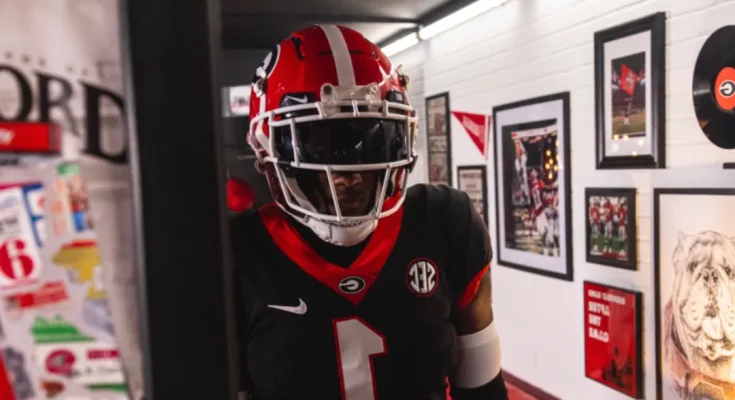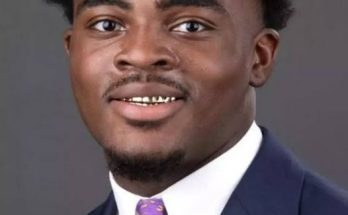Derrek Cooper, the nation’s No. 1 running back in the 2026 class, had the entire college football world on edge. His recruitment was the stuff of five-star legend: visits to powerhouse programs, cryptic social media posts, and insiders tossing out conflicting predictions. Georgia, with its dynasty pedigree and history of elite running backs, seemed like the obvious frontrunner for months. But when Cooper made his decision public, donning burnt orange and flashing the Longhorns hand sign, it sent shockwaves through the SEC. Texas had just landed the most electrifying back in the nation—and Cooper finally explained why.
The decision didn’t come easy. Georgia had everything a running back could want. A history of success with players like Nick Chubb, Todd Gurley, and D’Andre Swift. A system built around physicality, with a national championship roster and an NFL pipeline that few programs can rival. Kirby Smart and his staff rolled out the red carpet, making Cooper feel like a future Heisman winner in Athens. Yet, something was missing. The longer the process went on, the more Cooper realized that he wasn’t just looking for a factory that churns out pros—he wanted a place that felt like home, and a coach who didn’t just recruit his talent, but who believed in his future as a leader.
Enter Steve Sarkisian and the Texas Longhorns. Sarkisian didn’t try to out-pitch Georgia with history; he focused on vision. Cooper recalls the conversation that shifted everything: “Coach Sark didn’t talk about who came before me—he talked about what I could build at Texas. He told me I could be the best back to ever wear the jersey, that I could change the culture and leave a legacy. That hit different.”
That vision, paired with Texas’ surging momentum on the recruiting trail and the team’s offensive identity, gave Cooper something he couldn’t ignore. The Longhorns are no longer just a sleeping giant—they’re wide awake. With Texas entering its SEC era, Sarkisian has been aggressive, not only landing five-star talents but developing them. The offense is dynamic, explosive, and increasingly tailored to hybrid backs like Cooper—guys who can run between the tackles, bounce outside, and catch passes in space.
The Longhorns made sure Cooper understood he wasn’t just a piece of the puzzle—he was the crown jewel of the 2026 class. Texas fans, coaches, and current players all joined in the effort. Star quarterback Trey Owens, already committed, built a strong relationship with Cooper, frequently texting and FaceTiming to build chemistry. Cooper said it felt like he was already part of the team before he ever stepped on campus again after his official visit.
It wasn’t just the pitch or the players. It was also the feeling that Austin, not Athens, would allow him to fully express himself—on and off the field. Cooper is known for his charisma, his social media presence, and his interest in media and entrepreneurship. He wants to capitalize on his platform during college, and Texas’ NIL infrastructure gave him a clear edge. “It’s more than just ball,” Cooper admitted. “Texas gives me the stage to be a star in every way—on the field, in the community, in business. They get that.”
Recruiting insiders say that NIL wasn’t the deciding factor, but it was part of a broader appeal that made the Longhorns impossible to ignore. Austin’s tech-forward environment, media reach, and branding ecosystem are on a different tier. And with the Longhorns entering the SEC, Cooper saw a chance to have the best of both worlds: elite competition and massive exposure.
But there’s something else that sealed the deal—Texas’ hunger. While Georgia has been the hunted, Texas is now hunting, and Cooper thrives on that energy. He doesn’t want to just blend in with a loaded roster of five-stars. He wants to be the face of a revolution. “At Georgia, I might’ve been another great back. At Texas, I can be the back. I can be the reason we go to the top,” Cooper explained.
Make no mistake, Georgia didn’t back off. They pressed hard until the end. But multiple sources say Texas’ relentless, authentic approach won the day. Sarkisian himself made three trips to visit Cooper and his family personally, including one surprise visit that reportedly left Cooper’s mother emotional. “Coach Sark talked to my mom like she was his own family,” Cooper said. “He made sure she knew I’d be taken care of.”
That personal touch—along with Texas’ surge in offensive line recruiting, wide receiver talent, and quarterback depth—showed Cooper this wasn’t a one-man mission. It was a movement. He could be the centerpiece of an offense that, even after losing stars to the NFL, continues to climb national rankings.
Now, Texas fans are celebrating a commitment that redefines expectations for the 2026 class. Cooper is not just a five-star running back. He’s a culture-changer. The kind of player who makes others want to follow. Already, his commitment has reportedly had a ripple effect. Other top offensive targets are rumored to be strongly considering Texas now that Cooper is locked in, knowing they’d be joining a unit with rare potential.
While Georgia will reload—as they always do—there’s no denying this one stung. Losing a generational back to an SEC rival is never easy, especially one that had seemed to be leaning your way for most of the cycle. But Cooper says this was never about disrespecting Georgia. “I’ve got love for Georgia, Coach Smart, and what they’re building. But for me, it came down to where I felt I could be different, and Texas gave me that.”
Cooper’s commitment marks another major win for Sarkisian and the Texas staff, who have been on fire in the 2025 and 2026 cycles. They’ve landed top-tier talent across every position group, and Cooper’s announcement just confirmed that they can go head-to-head with any program in the country—including the elite of the SEC—and come out on top.
As Cooper looks toward his senior season of high school, all eyes will be on him. Every carry, every highlight, every quote will carry the weight of a program hungry for national relevance and ready to finally break through. For Texas, Cooper represents the future. For the SEC, he represents a threat. And for himself, he represents a dream in motion—a dream of glory, of legacy, and of rewriting what it means to be a Longhorn.
Derrek Cooper shocked the SEC, but for him, the decision was simple. Texas didn’t just want him—they believed in him. And now, the nation will watch as the next great Texas star begins his journey, not in red and black, but in burnt orange.



